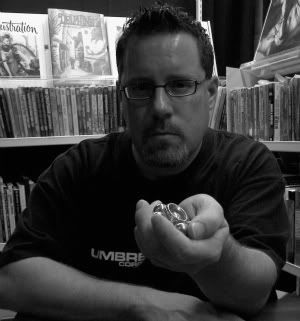Starting this month I'm going to do a monthly post about the short science fiction stories (short stories, novelettes, novellas) we read and discuss each week at the Classic Science Fiction Message Board. The best part is that the stories are always available for FREE online so anyone can participate. This post will be updated all month as we read each story and share our thoughts. This month Carl V. is choosing the stories:
Carl V. Anderson was born and raised in the original Star Wars
generation. He cut his science fiction teeth on novelizations of the
films and spin-off stories by the likes of Brian Daley and Alan Dean
Foster while taking on the role of Boba Fett in neighborhood games of
Star Wars. His first foray outside of the imagination of George Lucas
happened when he grabbed a book from his uncle's bookshelf, turned over
the back cover and read the words, "Interstellar Outlaw"--a lifelong
love of Slippery Jim DiGriz, the Stainless Steel Rat, was born. Through
the ensuing decades he has partaken of science fiction hard and
not-so-hard, classic and modern. Though he enjoys books of both eras,
there is an essence of nostalgia in reading the classics of the genre
that is heady and addicting in a way no other reading can match. Carl V.
considers the internet a very special gift, allowing readers of like
fiction to bond in a way that defies the idea that reading is a
solitary activity. You can find Carl waxing poetic over a whole host of
book and non-book material on his site, Stainless Steel Dropping. Carl would love to be invited over to play Star Wars with you in the
back yard. His only request is, can he please be Han Solo, just
once?!?!
Carl's bio really reminds me of a quote he shared at his blog recently. "I have never listened to anyone who criticized my taste in space travel, sideshows or gorillas. when this occurs, I pack up my dinosaurs and leave the room" - Ray Bradbury. And I know the secret to Carl's success, he's got a really cool man-cave in his basement:
Week # 1- Scanners Live in Vain by Cordwainer Smith (1950)
Martel is a Scanner, a position honored by all for it is the Scanners
who make the complexity of space travel possible. In order to become a
Scanner men must voluntarily cut themselves off from
all sensory input, with the exception of sight, to man specialized
suits that allow them to function under the extreme conditions necessary
for assisting with interstellar travel. Martel is a good Scanner and he
is proud of the work he does, as is his ever-patient wife Luci. When
rumors arrive that a man
may have discovered a secret to space travel that would free the
Scanners, an assassination is planned. Martel must decide between the
life of pride that he has known as a scanner and the chance to perhaps
recapture what it is like to be truly human.
This is an amazing
story.
The ideas that Smith explores with this story are just incredible. He
wastes no time in drawing the reader into the immediacy of Martel's
predicament, allowing the details of this strange future to unfold as
Martel struggles with the life he used to have and the life he has now.
"Scanners Live in Vain" is worthy of the praise it has received, it is
the kind of story that proves just how powerful short stories in
this genre can be.
Week # 2- It's a Good Life by Jerome Bixby (1953)
"It's a Good Life" is about a 3 year old boy with incredible, "god-like"
powers and the effects of his presence in the lives of the people who
live near him. You may be familiar with the story, as I am, from the 1961 episode of
the same name from the television series, The Twilight Zone.
Week # 3- A Martian Odyssey by Stanley G. Weinbaum.
According to Wiki the story was "originally published in the July 1934 issue of Wonder Stories. It was Weinbaum's first published story, and remains his best known."
Continuing on with Wiki's info: "Isaac Asimov states that Weinbaum's "easy style and his realistic description of extraterrestrial scenes and life-forms were better than anything yet seen, and the science fiction reading public went mad over him." The story "had the effect on the field of an exploding grenade. With this single story, Weinbaum was instantly recognized as the world's best living science fiction writer, and at once almost every writer in the field tried to imitate him."
High praise from Mr. Asimov! With that kind of introduction how could I not choose this story for us to examine.
Week # 4- Nightfall by Isaac Asimov
"Nightfall" first appeared in Astounding Science Fiction in September of 1941. Asimov stated that he wrote the story after Campbell asked him to write a story about this quote from Ralph Waldo Emerson:
"If the stars should appear one night in a thousand years, how would men believe and adore, and preserve for many generations the remembrance of the city of God which had been shown!"
I've been interested in reading the short story (and the expanded novel by Asimov and Silverberg) since reading about the story in one of Michael Whelan's art books last year. I like the idea of darkness coming to a planet that is bathed in light and what preparations for that might look like, and how people would be affected. I'm also a fan of Asimov and would enjoy reading this one for the first time and discussing it with this group. I hope you all enjoy it too.


Hey John, this is a very cool way to present our short story of the week and the picker of the month.
ReplyDeleteI like it John and am honored to be the guinea pig. Glad you had a half way decent pic of me to choose. Although that being said I have lost 32 pounds since that was taken. Need to do some before and after posts on my blog sometime.
ReplyDeleteVery nice, John!
ReplyDelete